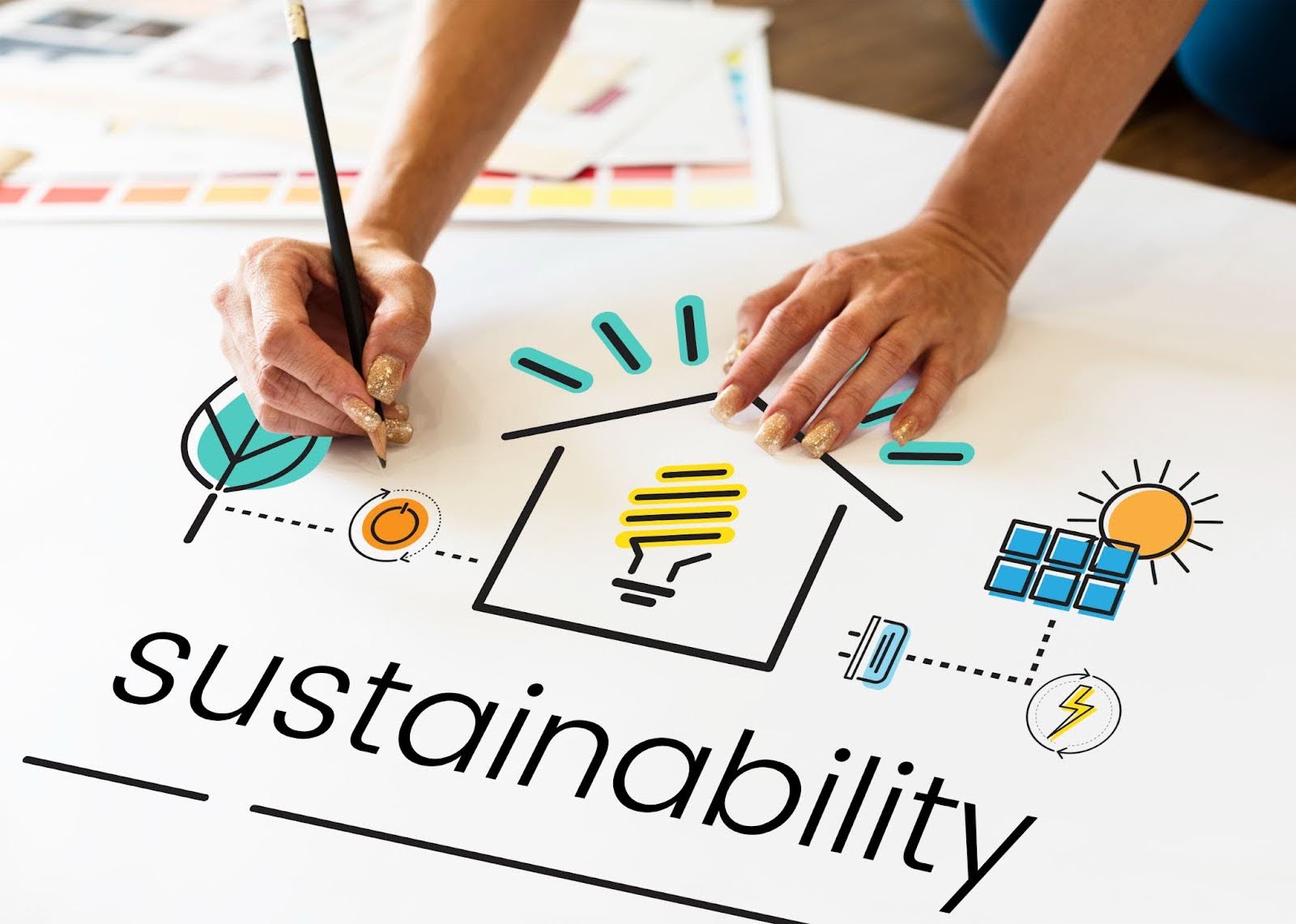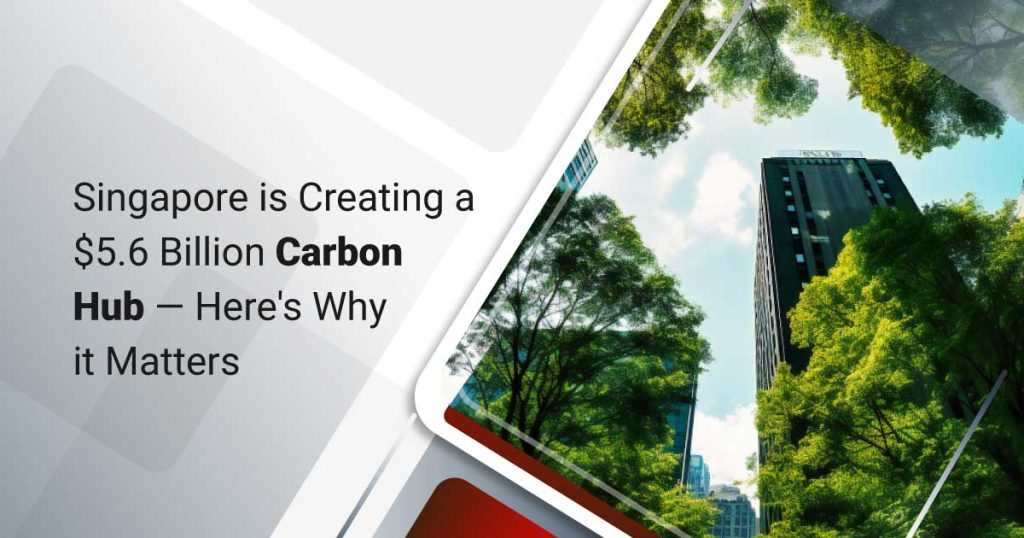Singapore, renowned for its strategic position in global trade, particularly in commodities like oil, gas, minerals, and metals, is embarking on a transformative journey.
In a bold move that aligns with global sustainability trends and offers significant economic promise, Singapore is shifting its focus to become a major player in the
carbon trading market.

This strategic pivot is not just about adapting to environmental imperatives, it’s something Singapore has become famous for — a calculated economic decision for the long term.
According to the Economic Development Board (EDB), Singapore’s carbon hub could generate a remarkable $5.6 billion in gross value for the state’s economy by 2050.
This projection is a powerful draw for international investors, signaling both Singapore’s commitment to sustainable development and the substantial economic opportunities inherent in the carbon market. By exploring this transition, we gain insights into Singapore’s role in
shaping the future of global trade and environmental stewardship.
Understanding the significance of this transition is crucial for international investors, as it represents a convergence of economic opportunity and environmental stewardship.
Singapore’s Carbon Hub Ambitions: A Vision for the Future
In 2019, Singapore announced its ambition to become a regional leader in carbon trading, reflecting its commitment to combating climate change and its foresight in recognising the potential of the carbon market.
This vision includes establishing a comprehensive ecosystem for carbon services – from the purchase of carbon credits to their
monitoring, reporting, and even climate risk analysis. This ambition positions Singapore not just as a market participant but as a leading facilitator and regulator in the Asian carbon market.
The 2019 announcement by Singapore’s government wasn’t a mere declaration; it was a strategic move underpinned by a series of planned and targeted actions. It signaled Singapore’s intent to be at the forefront of a market that is crucial to global efforts to mitigate climate change.
Foundations of Singapore’s Carbon Strategy: Building Blocks of a Green Future

Carbon Tax of 2019: A Pioneering Step
One of the foundational steps taken by Singapore in its 2019 announcement was the introduction of a carbon tax. This tax was applied to 80% of the domestic emissions, a significant coverage by global standards. It set a precedent and demonstrated Singapore’s commitment to its carbon reduction goals.
Singapore Green Finance Centre and Research Hubs: Fostering Innovation
The establishment of the Singapore Green Finance Centre and dedicated research centres for nature-based climate solutions are pivotal in Singapore’s carbon strategy.
These institutions are not just academic or financial entities; they are hubs of innovation and collaboration,
driving research and development in sustainable practices and
green finance.
Strategic Position for Carbon Trading: Leveraging Location and Expertise
Singapore’s geographical location and its established prowess in financial and trading sectors give it a unique advantage in the carbon trading market. The city-state is strategically positioned to tap into the vast potential of nature-based carbon removal solutions prevalent in Asia.
Regional and Global Context: Singapore’s Role in a Larger Framework
Asian Nations’ Involvement in Carbon Credit Supply
Singapore’s carbon hub ambition is set against the backdrop of an increasingly environmentally conscious Asia. With 16 Asian nations actively involved in the global supply of carbon credits, the region is emerging as a key player in the carbon market.
Singapore’s role in this context is not just as a market participant, but as a facilitator and leader, influencing investment in carbon trading.
Supporting Regional Growth and Investment
This means Singapore’s role extends beyond its borders, impacting regional growth and fostering investment in carbon credits. This involvement is crucial in promoting sustainable practices across Asia and ensuring that the growth of carbon markets is aligned with global environmental goals.
Economic Impact: A Catalyst for Growth and Recovery
Projected Contribution to Singapore’s Economy
The Economic Development Board’s projection of the carbon hub contributing approximately $5.6 billion to Singapore’s economy by 2050 highlights the economic significance of this initiative. This projection is, of course, a large number, but it also reflects the potential for
job creation, innovation, and sustainable economic growth.
Post-Pandemic Recovery and Green Strategy
In some ways, the COVID-19 pandemic is responsible for this bold plan for sustainability. In 2019, the government set up the “Emerging Stronger Taskforce” to explore possible new growth areas to help in its post-pandemic recovery.
The carbon trading hub model recognises the dual objectives of economic recovery and environmental sustainability, positioning Singapore as a leader in green growth.
Key Players and Platforms in Singapore’s Carbon Market: Driving Innovation and Trade
InterOpera: One-Stop Green Attributes Platform
InterOpera operates the OperaX platform, providing a comprehensive SaaS solution for the global transition to net-zero emissions and sustainable energy.
Its OperaX platform provides a comprehensive digital infrastructure that facilitates the entire lifecycle of green attributes, including registration, issuance, management, trading, retirement, and analysis. InterOpera’s approach is an excellent example of how technological advancements are being leveraged for environmental goals.
AirCarbon Exchange (ACX): Blending Technology with Sustainability
ACX represents the cutting-edge blend of technology and sustainability. Utilising blockchain technology, this platform provides a range of voluntary carbon credits, ensuring transparency and efficiency in transactions.
Asia Carbon Institute (ACI): Focusing on Urban Solutions
ACI’s focus on technology-based and urban-related carbon removal solutions places it at the forefront of addressing carbon emissions in urban settings. Its role is crucial in developing solutions tailored to the unique challenges and opportunities presented by urban environments.
The Future Outlook: A World of Opportunities and Responsibilities
Embracing the Potential of a Carbon-Conscious World

Singapore’s proactive stance in establishing itself as a carbon hub signals not just a change in economic focus, but a commitment to a sustainable future. This forward-thinking approach places Singapore at the epicentre of a global shift towards carbon consciousness.
With countries and corporations increasingly looking to reduce their carbon footprints, the demand for carbon credits and sustainable commodities is expected to surge. Singapore’s role in this paradigm shift extends beyond mere trading; it encompasses being a facilitator and innovator in a market that is still evolving.
Integrating Technology and Sustainability
One of the most exciting aspects of Singapore’s future as a carbon hub is the integration of technology into sustainability efforts. Platforms like Interopera are examples of how digital advancements can streamline carbon trading.
As technology continues to evolve, we can anticipate further innovations in this space, such as the use of blockchain for greater transparency and efficiency in carbon credit transactions. The incorporation of AI and big data could also play a significant role in analysing carbon markets, predicting trends, and enabling more informed decisions.
Expanding Singapore’s Green Influence
Singapore’s carbon hub ambitions are not just about dominating the carbon market; they are also about exerting a positive influence on regional and global environmental policies.
The city-state’s commitment to sustainability can inspire other nations, especially in Southeast Asia, to adopt more aggressive carbon reduction strategies. By leading through example, Singapore has the potential to elevate the entire region’s approach to climate change and sustainability.
Challenges and Responsibilities
However, with these opportunities come significant responsibilities. As a burgeoning hub for carbon trading, Singapore must ensure the integrity and efficacy of its carbon market.
This means implementing robust regulatory frameworks, ensuring the accuracy and verification of carbon credits, and promoting transparency in all transactions. Additionally, Singapore has a responsibility to ensure that its carbon market contributes to genuine carbon reduction efforts and does not become a tool for greenwashing.
Where to Next With InCorp
As Singapore positions itself as a key player in the global carbon market, the opportunities for growth and sustainability are immense. InCorp, at the forefront of leveraging these developments, offers unparalleled expertise and services to help you navigate this evolving market.
Whether it is understanding carbon credits, exploring investment opportunities, or aligning your business with sustainable practices, InCorp is your go-to partner.
Don’t miss the chance to be a part of this green revolution.
Contact InCorp today to discover how you can leverage the potential of Singapore’s carbon market for a sustainable and prosperous future.
FAQs About Singapore as a Carbon Market
- Singapore is establishing itself as a leading carbon hub in Asia, offering comprehensive carbon services like trading, monitoring, and climate risk analysis. It aims to leverage its strategic position to facilitate the growth of the carbon market both regionally and globally.
- Key platforms include Climate Impact X (CIX), InterOpera, AirCarbon Exchange (ACX), and Asia Carbon Institute (ACI), each playing a significant role in the trading and management of carbon assets.
- InCorp offers expert guidance in navigating the carbon market, including services in carbon credit trading, ESG reporting, and carbon accounting. Contact InCorp to learn how to align your business with the opportunities in Singapore’s carbon hub.
About the Author
Alton Neo
Alton has deep technical expertise in the Singapore Financial Reporting Standards as well as hands-on experience in accounting for publicly-listed entities and growing enterprises in Singapore. Beyond that, Alton also provides expertise to fund managers and family offices on structuring.
More on Business Blogs
 This strategic pivot is not just about adapting to environmental imperatives, it’s something Singapore has become famous for — a calculated economic decision for the long term.
According to the Economic Development Board (EDB), Singapore’s carbon hub could generate a remarkable $5.6 billion in gross value for the state’s economy by 2050.
This projection is a powerful draw for international investors, signaling both Singapore’s commitment to sustainable development and the substantial economic opportunities inherent in the carbon market. By exploring this transition, we gain insights into Singapore’s role in shaping the future of global trade and environmental stewardship.
Understanding the significance of this transition is crucial for international investors, as it represents a convergence of economic opportunity and environmental stewardship.
This strategic pivot is not just about adapting to environmental imperatives, it’s something Singapore has become famous for — a calculated economic decision for the long term.
According to the Economic Development Board (EDB), Singapore’s carbon hub could generate a remarkable $5.6 billion in gross value for the state’s economy by 2050.
This projection is a powerful draw for international investors, signaling both Singapore’s commitment to sustainable development and the substantial economic opportunities inherent in the carbon market. By exploring this transition, we gain insights into Singapore’s role in shaping the future of global trade and environmental stewardship.
Understanding the significance of this transition is crucial for international investors, as it represents a convergence of economic opportunity and environmental stewardship.

 Singapore’s proactive stance in establishing itself as a carbon hub signals not just a change in economic focus, but a commitment to a sustainable future. This forward-thinking approach places Singapore at the epicentre of a global shift towards carbon consciousness.
With countries and corporations increasingly looking to reduce their carbon footprints, the demand for carbon credits and sustainable commodities is expected to surge. Singapore’s role in this paradigm shift extends beyond mere trading; it encompasses being a facilitator and innovator in a market that is still evolving.
Singapore’s proactive stance in establishing itself as a carbon hub signals not just a change in economic focus, but a commitment to a sustainable future. This forward-thinking approach places Singapore at the epicentre of a global shift towards carbon consciousness.
With countries and corporations increasingly looking to reduce their carbon footprints, the demand for carbon credits and sustainable commodities is expected to surge. Singapore’s role in this paradigm shift extends beyond mere trading; it encompasses being a facilitator and innovator in a market that is still evolving.


